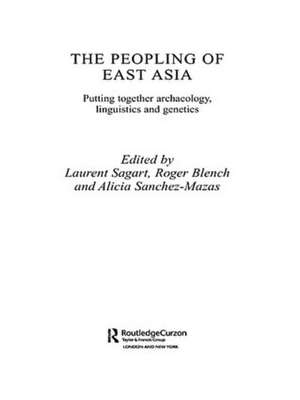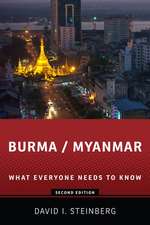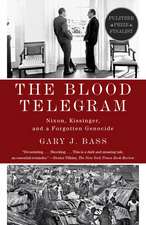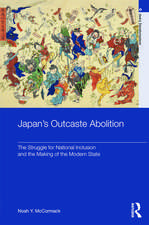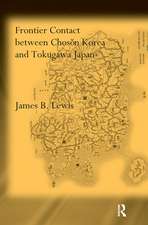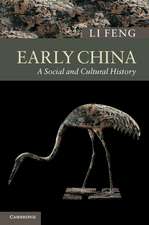The Peopling of East Asia: Putting Together Archaeology, Linguistics and Genetics
Editat de Roger Blench, Laurent Sagarten Limba Engleză Paperback – 26 aug 2015
| Toate formatele și edițiile | Preț | Express |
|---|---|---|
| Paperback (1) | 300.48 lei 6-8 săpt. | |
| Taylor & Francis – 26 aug 2015 | 300.48 lei 6-8 săpt. | |
| Hardback (1) | 826.68 lei 6-8 săpt. | |
| Taylor & Francis – 21 mar 2005 | 826.68 lei 6-8 săpt. |
Preț: 300.48 lei
Preț vechi: 357.13 lei
-16% Nou
Puncte Express: 451
Preț estimativ în valută:
57.49€ • 60.04$ • 47.48£
57.49€ • 60.04$ • 47.48£
Carte tipărită la comandă
Livrare economică 16-30 aprilie
Preluare comenzi: 021 569.72.76
Specificații
ISBN-13: 9781138862234
ISBN-10: 1138862231
Pagini: 360
Ilustrații: 39 black & white illustrations, 8 colour illustrations, 84 black & white tables, 1 black & white halftones, 38 black & white line drawings
Dimensiuni: 156 x 234 x 20 mm
Greutate: 0.5 kg
Ediția:1
Editura: Taylor & Francis
Colecția Routledge
Locul publicării:Oxford, United Kingdom
ISBN-10: 1138862231
Pagini: 360
Ilustrații: 39 black & white illustrations, 8 colour illustrations, 84 black & white tables, 1 black & white halftones, 38 black & white line drawings
Dimensiuni: 156 x 234 x 20 mm
Greutate: 0.5 kg
Ediția:1
Editura: Taylor & Francis
Colecția Routledge
Locul publicării:Oxford, United Kingdom
Public țintă
Postgraduate and ProfessionalCuprins
Introduction 1. Examining the Farming/Language Dispersal Hypothesis in the East Asian Context 2. From the Mountains to the Valleys: Understanding Ethnolinguistic Geography in Southeast Asia 3. The Origin and Dispersal of Agriculture and Human Diaspora in East Asia 4. Recent Discoveries at a Tapenkeng Culture Site in Taiwan: Implications for the Problem of Austronesian Origins 5. The Contribution of Linguistic Palaeontology to the Homeland of Austroasiatic 6. Tibeto-Burman vs. Indo-Chinese: Implications for Population Geneticists, Archaeologists and Prehistorians 7. Kra-dai and Austronesian: Notes on Phonological Correspondences and Vocabulary Distribution 8. The Current Status of Austric: A Review and Evaluation of the Lexical and Morphosyntactic Evidence 9. Sino-Tibetan-Austronesian: An Updated and Improved Argument 10. Tai-Kadai as a Subgroup of Austronesian 11. Proto-East Asian and the Origin and Dispersal of the Languages of East and Southeast Asia and the Pacific 12. The Physical Anthropology of the Pacific, East Asia, and Southeast Asia: A Multivariate Craniometric Analysis 13. Genetic Diversity of Taiwan's Indigenous Peoples: Possible Relationship with Insular Southeast Asia 14. Genetic Analysis of Minority Populations in China and its Implications for Multi-Regional Evolution 15. Comparing Linguistic and Genetic Relationships among East Asian Populations: A Study of the RH and GM Polymorphisms 16. Hla Genetic Diversity and Linguistic Variation in East Asia 17. A Synopsis of Extant Y Chromosome Diversity in East Asia and Oceania
Notă biografică
Laurent Sagart is Senior Researcher with the Centre National de la Recherche Scientifique, Paris, France. He is the author of three books and numerous articles on Chinese dialectology, Old Chinese phonology and morphology, comparative Chinese linguistics, and the Austronesian languages.
Roger Blench is an independent scholar and consultant working in international development but also on language and prehistory. He has edited Language and Archaeology Vols. I-IV (Routledge, 1997-9) as well as a book on the history of African livestock.
Alicia Sanchez-Mazas is Professor of Population Genetics and Anthropology at the University of Geneva, Switzerland. Her main research interest is the evolution of modern humans. She published many articles on worldwide genetic diversity and its relation to human peopling history.
Roger Blench is an independent scholar and consultant working in international development but also on language and prehistory. He has edited Language and Archaeology Vols. I-IV (Routledge, 1997-9) as well as a book on the history of African livestock.
Alicia Sanchez-Mazas is Professor of Population Genetics and Anthropology at the University of Geneva, Switzerland. Her main research interest is the evolution of modern humans. She published many articles on worldwide genetic diversity and its relation to human peopling history.
Descriere
Recent findings in the fields of East Asian archaeology, linguistics and genetics are collected together here, making this an ideal reference tool for scholars in all disciplines working on the reconstruction of the East Asian past.
